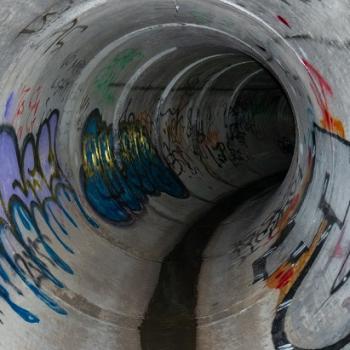[A content warning for this post: I’m discussing issues of consent and sexual abuse in our communities. There are no overt references to any acts or events, but as ever, I encourage anyone sensitive to these issues to exercise caution and self-care. —♥]
Hello, beautiful creatures.
I’ve spent some time on Outside the Charmed Circle writing about issues of consent in the Pagan, polytheist, and occult communities, in relation to both spiritual and social praxis. More recently, I’ve written about the problem of sexual abuse in our intersecting communities, and our responsibility to address it. This isn’t a problem to be solved on a case-by-case basis, because it’s not a simple problem of specific bad actors doing bad things. A cursory examination of news headlines in the past few months will demonstrate that this a cultural issue, one we share with the overculture in which our subcultural communities are suspended: as above, so below.
We have to decide who we are: a community which values consent and protects its own, or a community which turns a blind eye to rape and abuse.
If we want to our communities to be the safe, welcoming spaces we tell ourselves they are, we can’t just wring our hands and point fingers. We have to address the core issues which make them unsafe. We have to change, both individually and communally, and proactively rather than reflexively. It’s not enough to condemn abuses when they happen. We have to normalize consent as a core, non-negotiable value of our communities, and we have to be willing to take action, collectively and individually, against every bad actor or “missing stair” in our communities who violates that value. That could mean revoking people’s access to our communities if they’re found to be abusive or predatory, or it could mean direct intervention in emergent situations, stopping them as they happen. That could mean involving law enforcement and taking legal action against abusers and predators.
I can’t possibly hope to cover all possible circumstances here. What I can do, though, is make a few suggestions for concrete steps we can take towards being a culture of consent.
Don’t assume, ask.
Simple, right? Don’t assume you have a right to someone else’s body, attention, time, or energy. If you want something from someone, ask… and if they say “no,” or if they say anything other than an unequivocal “yes,” move the hell on. Perhaps someday down the road when we’ve got all these problems sorted out, we can all rely on unspoken cues, natural charms, and telepathy. In the meantime, we have to live in this world, where most people are only just starting to understand the extent of our culture’s problem with consent, a world where affirmative consent (also known as “yes means yes”) is somehow a controversial notion.
Don’t imply, inform.
This is kind of the flipside of the previous suggestion. Rather than leaving certain things unspoken, relying on coy suggestions and clouded language to imply certain things, let’s use our words. Say what we mean. “I’d like to have sex with you,” “I’m open to that,” and “I’m not interested” are all straightforward sentences with little ambiguity to them. If we’re unwilling to express our desires, intentions, or goals in straightforward terms, we should stop and think about why we’re unwilling.
Don’t evade, engage.
It’s a lot easier to deflect, postpone, or avoid dealing with uncomfortable situations than it is to face up to them, especially when we’re not directly involved in the situation in question. Unfortunately, it’s exactly this kind of avoidance, often couched in terms of “it’s not my business,” which creates an environment in which abusers and predators thrive. If we want to be a culture of consent, we have to engage. We have to connect with the other people in our communities, and not look away when we suspect something might be amiss.
Don’t despair, disrupt.
It’s also easy to give up, to think that we’re powerless to change our communities and our culture. Nothing is further from the truth. We are our communities, and we shape our culture by participating in it. If you’re involved in your local community, you can be a force for consent and empowerment merely by showing up and being willing to talk about these issues. In doing so, we disrupt the narrative that “this is just how things are.” Of course, doing the work isn’t easy… on the contrary, it can be scary as hell, and the sheer scope of it can leave us feeling overwhelmed. Fortunately, you’re not alone in doing this work. There are organizations all around the country, and the world, whose mission is to teach people how to engage with these issues in a positive, constructive way. As an example of the kind of thing I mean, the Anti-Violence Project at the University of Victoria conducts workshops on understanding consent culture and supporting survivors of sexual violence. Check your local region for similar organizations and workshops, and when you find them, go check them out.
Additionally, Critical Resistance has collected an amazing list of resources for addressing the harm done by sexual abuse and fostering both accountability and healing, both individually and communally, in subcultures outside the mainstream. In particular, the e-zine The Revolution Starts at Home: Confronting Partner Abuse in Activist Communities illustrates the effects of abuse on a survivor’s ability to engage with the community, and the ways in which communities can fail the very people they claim to serve. (A tip of the virtual hat to elf, a.k.a. elfwreck, for the suggestion.)
Believe survivors.
I could go on at length about what to do—and what not to do—if someone discloses to you that they’ve been raped, molested, or otherwise abused, but it all comes down to this: believe them. Don’t interrogate them, don’t ask them what they were wearing or drinking, and for the love of all that’s holy, don’t play “devil’s advocate.” Listen to them, support them, believe them. If they ask you for help, offer what help you can. Assure them that what happened wasn’t their fault. Believe them. Everything else follows from here.
All of these steps require us to be brave. They require us to be vulnerable, to be uncomfortable, even to risk danger. That’s what it means to be in community with one another: we share the risks, and we share the rewards. We have the power to shape our culture, to make our communities the places we want them to be. It’s hard work, but it’s nowhere near impossible. We just have to know what to do and how to do it, and then choose to do it.
Until next time, dear ones, be brave. ♥
The “Mirror” Series:
- A Long, Cold Look in the Mirror
- The Missing Stair and the Enabling of Abuse
- A Personal Recollection of Complicity
- Now Here, Nowhere—Where Now?
- A Brief Interlude on Words and Power
- An Ending, with Neither Closure nor Resolution
- Horses and Zebras: Some Thoughts on Abuse in Our Communities (epilogue)

















